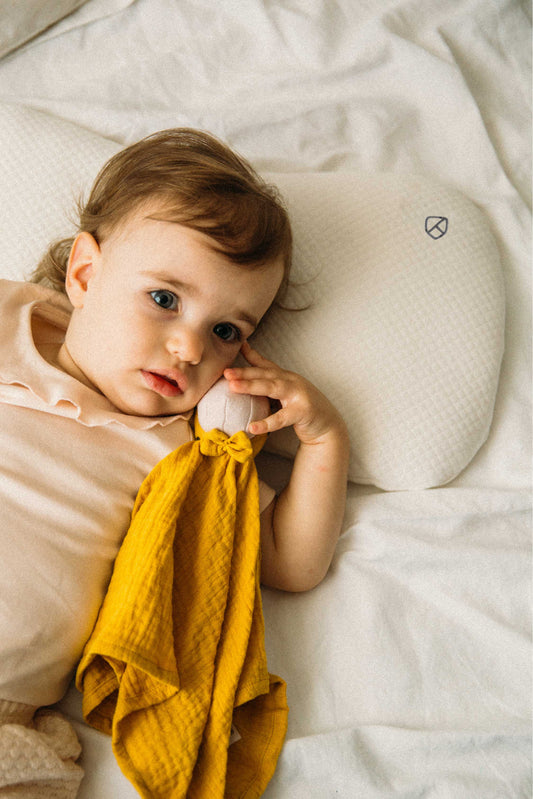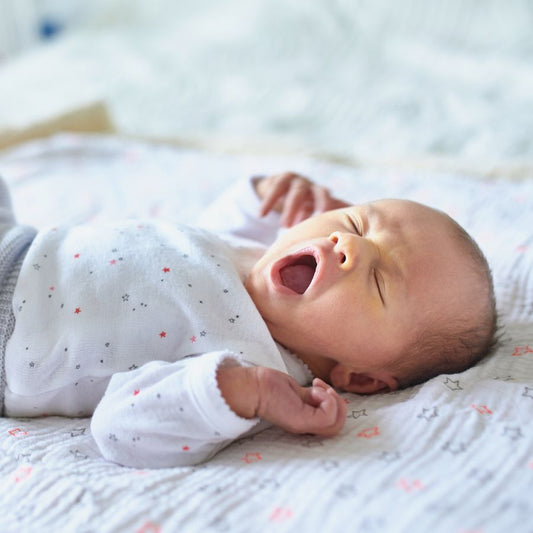When newborns don’t get enough sleep, or they’ve been awake too long, they tend to become overactive, fussy, unsettled and cry.
Before a baby becomes overly tired, we can prepare ourselves by learning how to understand their early sleep cues, so we put them down to sleep at the right time. What are the signs a baby is tired, depending on age? Read on.
What are the signs of tiredness from 0 to 18 months old?
First we have to consider the length of a baby’s wake window, which is the amount of time they can stay awake before needing a sleep. Up to 3 months old, babies generally spend most of their time asleep, and the maximum amount of time they can stay awake for is an hour and a half. From 4-6 months old, an infant’s wake window is usually around 2 hours. At 6-12 months old it increases to 3 hours, while babies and toddlers who are 12-18 months old should still ensure they have a morning and afternoon nap.
Baby tired signs from 0 to 3 months old
- Pulling or rubbing ears
- Clenching fists
- Yawning
- Opening and closing eyelids slowly
- Staring into space
- Making sudden movements with arms and legs, and arching backwards
Baby tired signs from 4 months old
- Rubbing eyes
- Yawning
- Fussy
- Demanding constant attention
- Tired of playing and unsettled
What happens if you ignore early signs of tiredness in babies?
If you don’t pick up on your baby’s early sleep cues signs, tiredness turns into overly excitable: the infant becomes fussy, unsettled, cries and easily frustrated, loses patience, and can be irritable.
The baby is now overly tired, and becomes more and more unsettled.
‘The more tired a baby is, the more they will sleep’ is completely untrue: if an infant is overly tired before falling asleep, they will need time to calm down beforehand. Their sleep will also be short and interrupted with awakenings.
The secret to a good night's sleep: neither overly tired nor too awake
We have already learnt that the more tired a baby is, the harder it is for them to have a good unbroken sleep. When a newborn is over-tired, they become fussy and unsettled, making it even more difficult to soothe and calm them.
There’s a scientific explanation for this phenomenon: dopamine (the neurotransmitter) is activated. It’s released when we’re tired but don’t actually lie down to sleep. Our body tries to activate its attention reserves to keep our brain awake while our body feels physically tired.
It also goes without saying that you shouldn’t put a baby who has just woken up and is full of energy down for a nap, otherwise they simply won’t sleep.
That’s why it’s important to find the right balance!
What can you do?
- Track your baby’s wake windows
- Establish a regular daily routine and a firm sleep schedule
- Understand and watch out for your baby’s sleep cues!
Understanding and learning about a newborn and baby’s sleep is very interesting, as it does not work like ours! Their sleep cycles follow a different pattern, as does their duration. Eager to know more? Read our post Understanding a baby’s sleep: starting with their sleep cycles!







